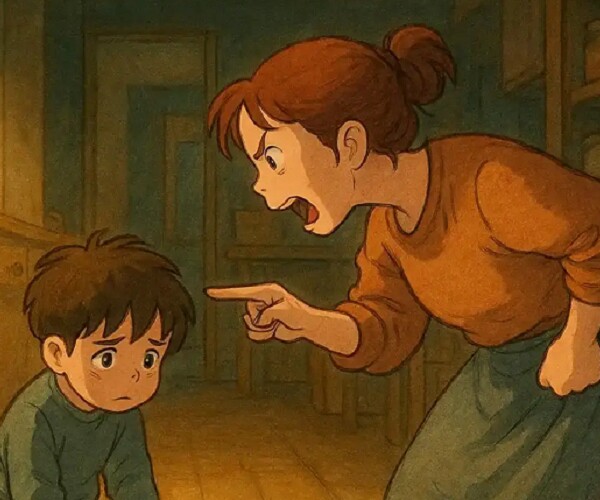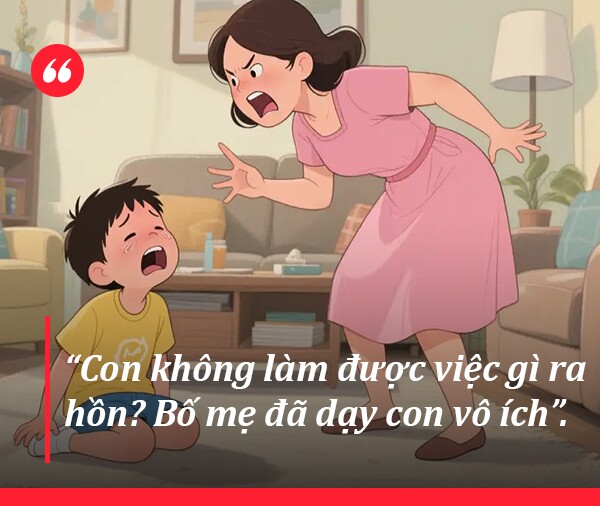The impact of critical words goes beyond the present, affecting how children perceive themselves and the world around them in the long term.


“Why can’t you do anything right? All our teachings have been in vain!”
In reality, bumps and obstacles on a child’s developmental path are normal. However, some mothers’ words of “complaint” can create knots in a child’s heart, affecting their emotions and psychology throughout their lives.
A netizen shared, “My mother often says this, but I’ve learned to pretend it doesn’t matter. I smile on the outside, but inside, I’ve gone cold.”
This reveals the psychological wounds inflicted by parental remarks, which children carry into adulthood. The conflict between outward expression and inner feelings can lead to loneliness and a lack of familial support and understanding.

Statements like “We raised you for nothing” diminish children’s self-confidence and sense of family attachment. This mentality leads to children becoming hesitant to express themselves, take risks, or pursue their dreams.
Moreover, negative remarks from parents can have long-lasting effects on children’s social relationships. As they grow up, they may become shy, reluctant to communicate or engage in community activities, trapping themselves in a closed circle. This impacts not only personal development but also the ability to form positive relationships in the future.

“Why do I have to live like this?”
Although just a complaint, it casts a dark cloud over the entire family, making everyone feel suffocated.
A blogger recounted her childhood: “My mother’s helpless sighs became the shadow of my youth. When I was little, her complaints felt like a mosquito buzzing around my head, inescapable. In middle school, I learned to wear headphones and lock my door, but the burden only grew heavier. I felt I was the source of her ‘misery.'”
Hearing this too often can make children feel indebted to their parents and even guilty. Worse, they may develop a habit of self-pity instead of problem-solving, drowning in thoughts like, “I’m so pitiful,” becoming another link in the chain of complaints.


“Your father is useless; if it weren’t for you, I would have divorced him long ago!”
This statement can be seen as the deciding blow in family arguments.
A girl shared on a forum that when she was young, her family argued almost daily. Whenever her father stormed out, her mother would pull her close and say, “You need to study hard. When you grow up and have a bright future, we’ll leave your father.”
As a child, she didn’t understand the complexities of marriage; she only felt like the “lifeline” of the family and lived more cautiously. This sentiment left her anxious and pressured, as if the responsibility for the family’s happiness rested solely on her shoulders.
In reality, many parents unconsciously use their sacrifices to justify marital unhappiness: “If it weren’t for the children, I would have divorced long ago!” or “I’m doing this for you.”

A mother commented, “Instead of torturing each other at home, it’s better to part ways amicably and give the children a better life.”
This perspective emphasizes that a healthy family environment should be built on respect and love, not arguments. Sometimes, inappropriate words from parents can ruin the warmth of home, making children feel insecure. While words of comfort build confidence, complaints make children feel unworthy of love.
Therefore, every child should grow up in a nurturing family where parents uplift and create happiness with positive words. Statements like “I love you” or “I believe in you” build a strong foundation for children to develop confidence and independence in the future.
Choosing the right words is crucial in fostering children’s holistic development. A positive family environment, filled with encouragement and love, empowers children to confidently face the world and become strong individuals capable of overcoming any challenge.
“4 Magical Phrases to Use When Your Child Argues Back: A Guide for Parents”
“The Power of Effective Communication: Transforming Defiant Children into Obedient Angels.
As parents, we hold the key to unlocking our children’s potential for obedience and respect. Our communication style plays a pivotal role in teaching our defiant little ones to become more compliant and understanding.”
A Mother’s Influence: Nurturing Virtues for a Child’s Destiny
As a parent, you play a pivotal role in shaping your child’s future. Your actions and behaviors serve as a roadmap for your child’s journey towards success. Instill values of hard work, dedication, and a growth mindset by being a role model yourself. Lead by example and watch your child flourish, mirroring your exemplary conduct.




































